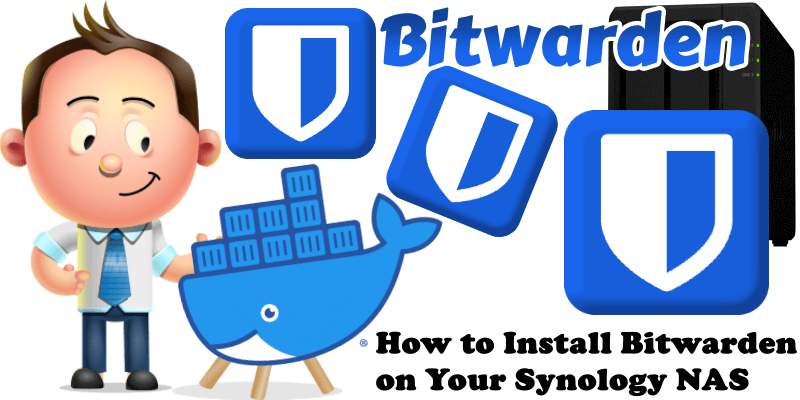
Bitwarden is a free and open-source password management (password manager) service that stores sensitive information such as website credentials in an encrypted vault. The Bitwarden platform offers a variety of client applications including a web interface, desktop applications, browser extensions, mobile apps, and a CLI. In this step by step guide I will teach you how to install the official Bitwarden on your Synology NAS device using Docker & Portainer. Note: If you want to Install Vaultwarden instead of Bitwarden, check out my articles on How to Install Vaultwarden on Your Synology NAS and Install Vaultwarden With Portainer. Note: If you like, you can use Passbolt as an alternative to Bitwarden.
This guide works perfectly with the latest Bitwarden v2026.2.0 release.
Warning: This is a beta release.
STEP 1
Please Support My work by Making a Donation.
STEP 2
Install Portainer using my step by step guide. If you already have Portainer installed on your Synology NAS, skip this STEP. Attention: Make sure you have installed the latest Portainer version.
STEP 3
Make sure you have a synology.me Wildcard Certificate. Follow my guide to get a Wildcard Certificate. If you already have a synology.me Wildcard certificate, skip this STEP.
STEP 4
Go to Control Panel / Login Portal / Advanced Tab / click Reverse Proxy. Follow the instructions in the image below.
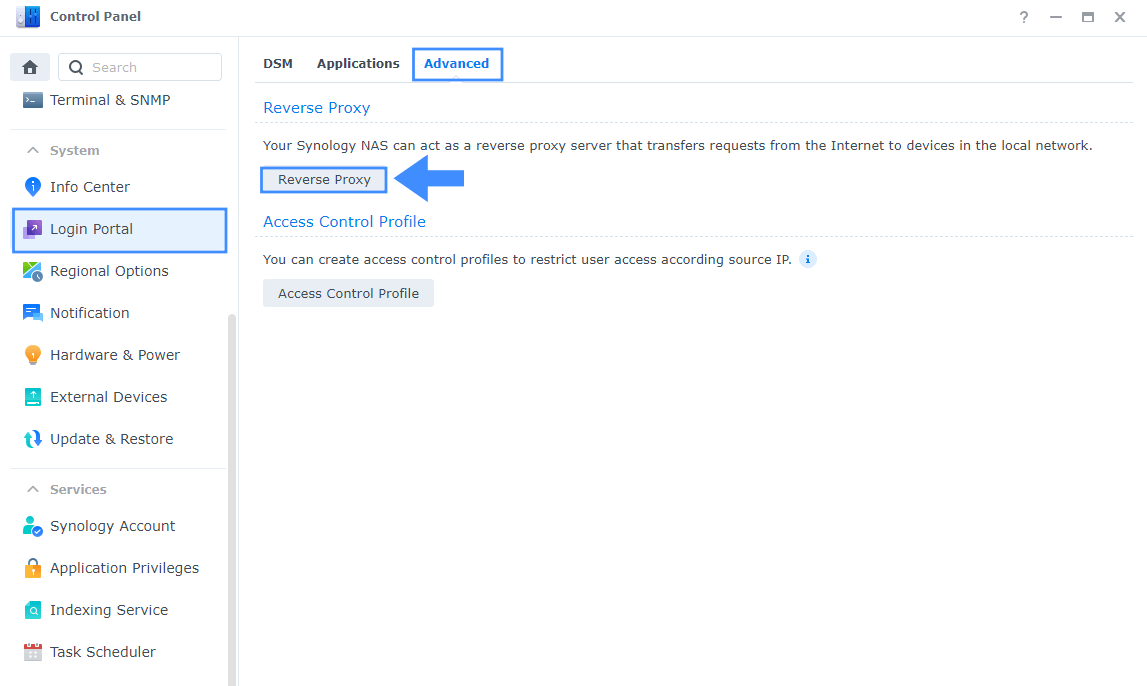
STEP 5
Now click the “Create” button. Follow the instructions in the image below.
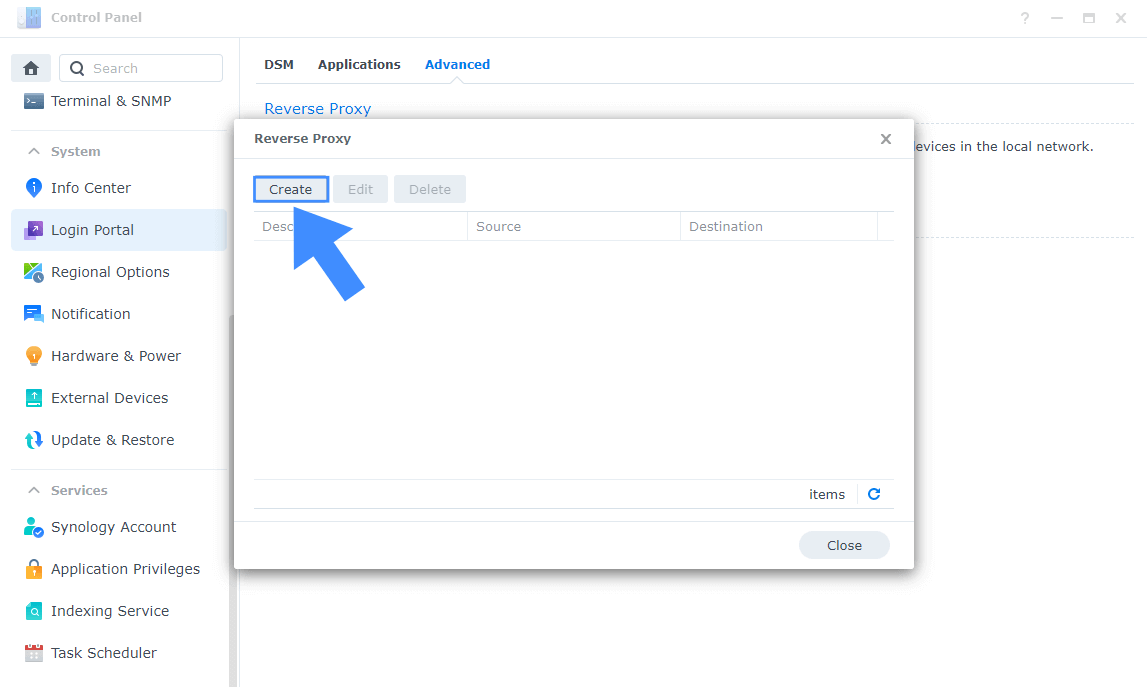
STEP 6
After you click the Create button, the window below will open. Follow the instructions in the image below.
On the General area, set the Reverse Proxy Name description: type in Bitwarden. After that, add the following instructions:
Source:
Protocol: HTTPS
Hostname: bitwarden.yourname.synology.me
Port: 443
Check Enable HSTS
Destination:
Protocol: HTTP
Hostname: localhost
Port: 9890
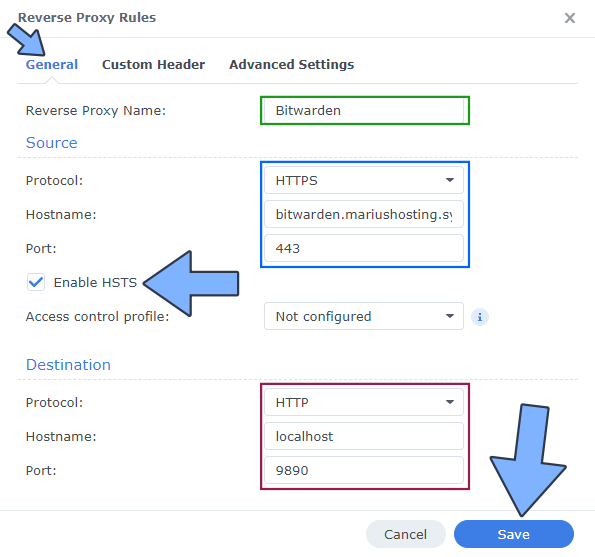
STEP 7
On the Reverse Proxy Rules, click the Custom Header tab. Click Create and then, from the drop-down menu, click WebSocket. After you click on WebSocket, two Header Names and two Values will be automatically added. Click Save. Follow the instructions in the image below.

STEP 8
Go to Control Panel / Network / Connectivity tab/ Check Enable HTTP/2 then click Apply. Follow the instructions in the image below.
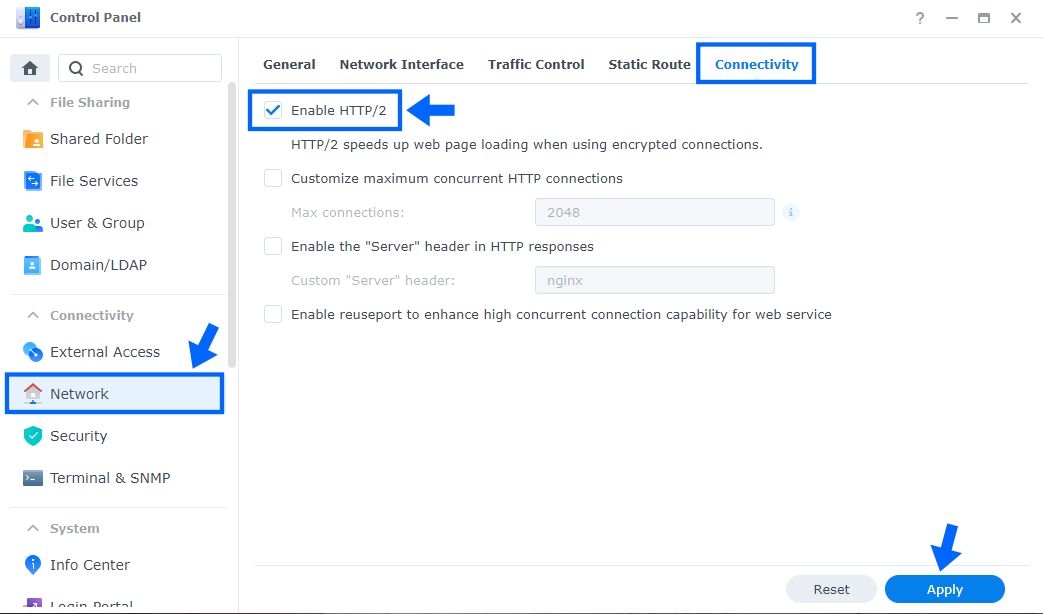
STEP 9
Go to Control Panel / Security / Advanced tab/ Check Enable HTTP Compression then click Apply. Follow the instructions in the image below.
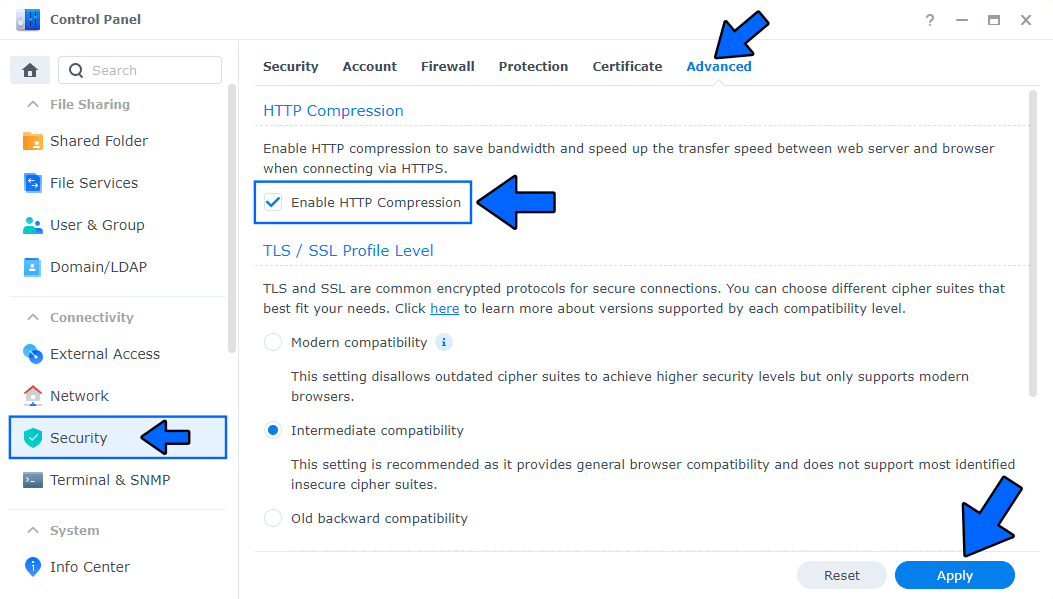
STEP 10
Go to File Station and open the docker folder. Inside the docker folder, create one new folder and name it bitwarden. Follow the instructions in the image below.
Note: Be careful to enter only lowercase, not uppercase letters.
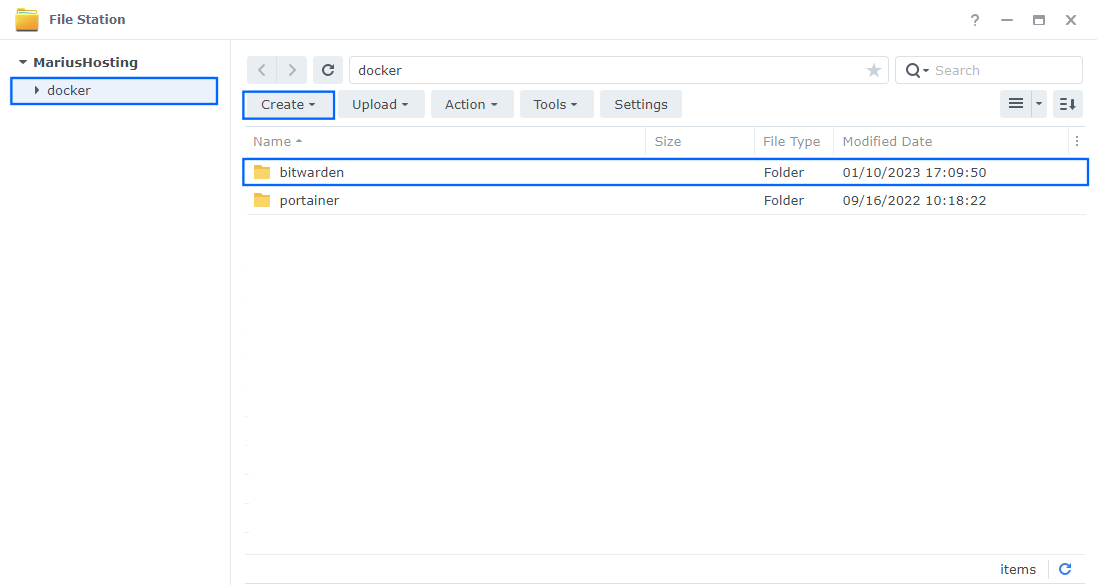
STEP 11
Now create three new folders inside the bitwarden folder that you created at STEP 10 and name them data, db, logs. Follow the instructions in the image below.
Note: Be careful to enter only lowercase, not uppercase letters.
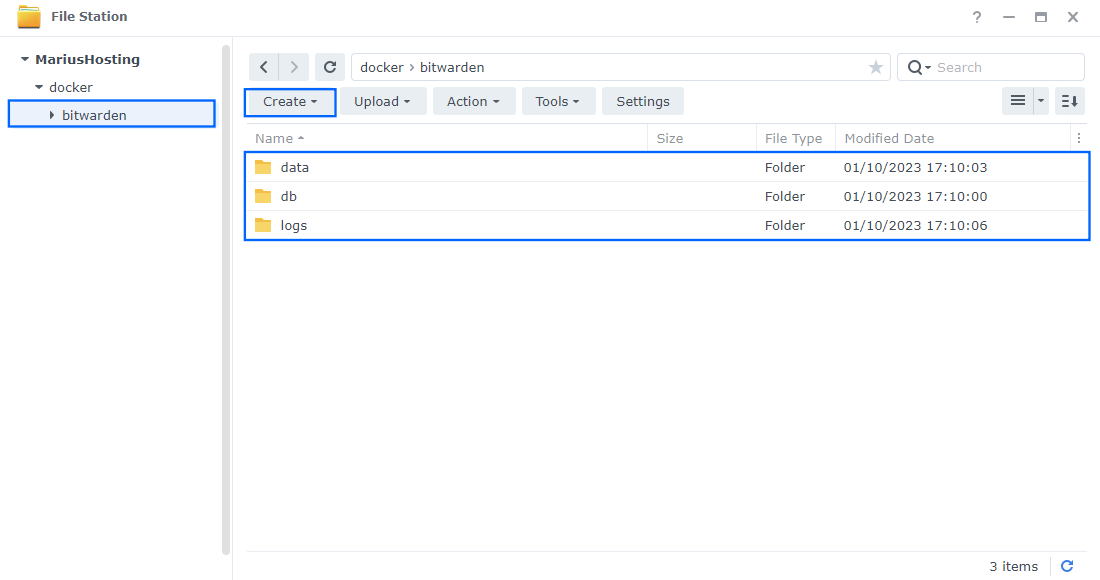
STEP 12
Download (click on the blue link below) and upload the my.cnf file below in the db folder that you have previously created at STEP 11. Follow the instructions in the image below. 🔒Note: Support my work to unlock the password. You can use this password to download any file on mariushosting forever!
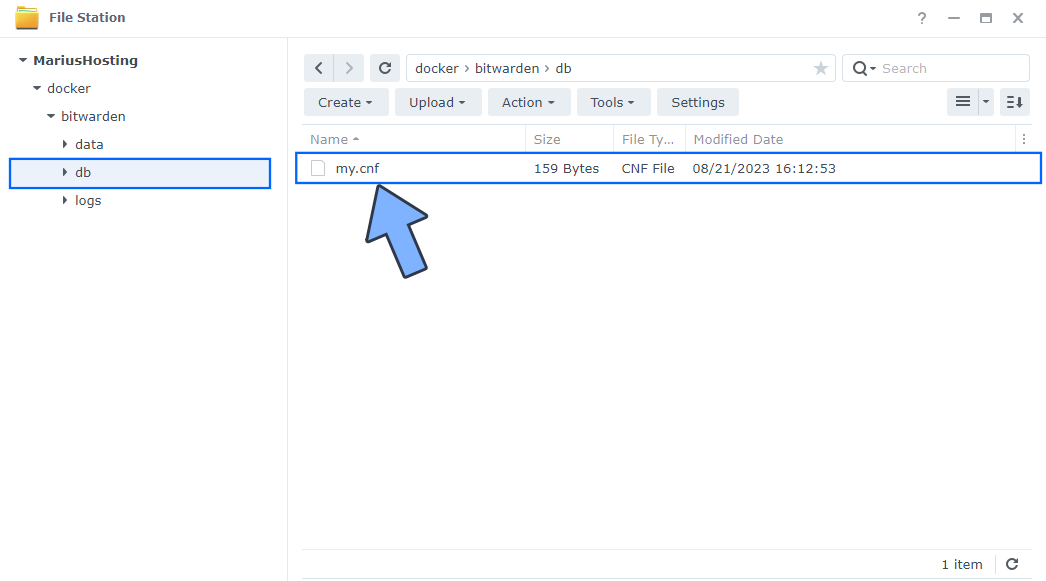
STEP 13
Launch your browser, then go to the official Bitwarden website by clicking on the blue link below.
On the Admin Email Address field, type in your own email. I recommend you use a Gmail account. Select your Data Region, then click Submit. Follow the instructions in the image below.
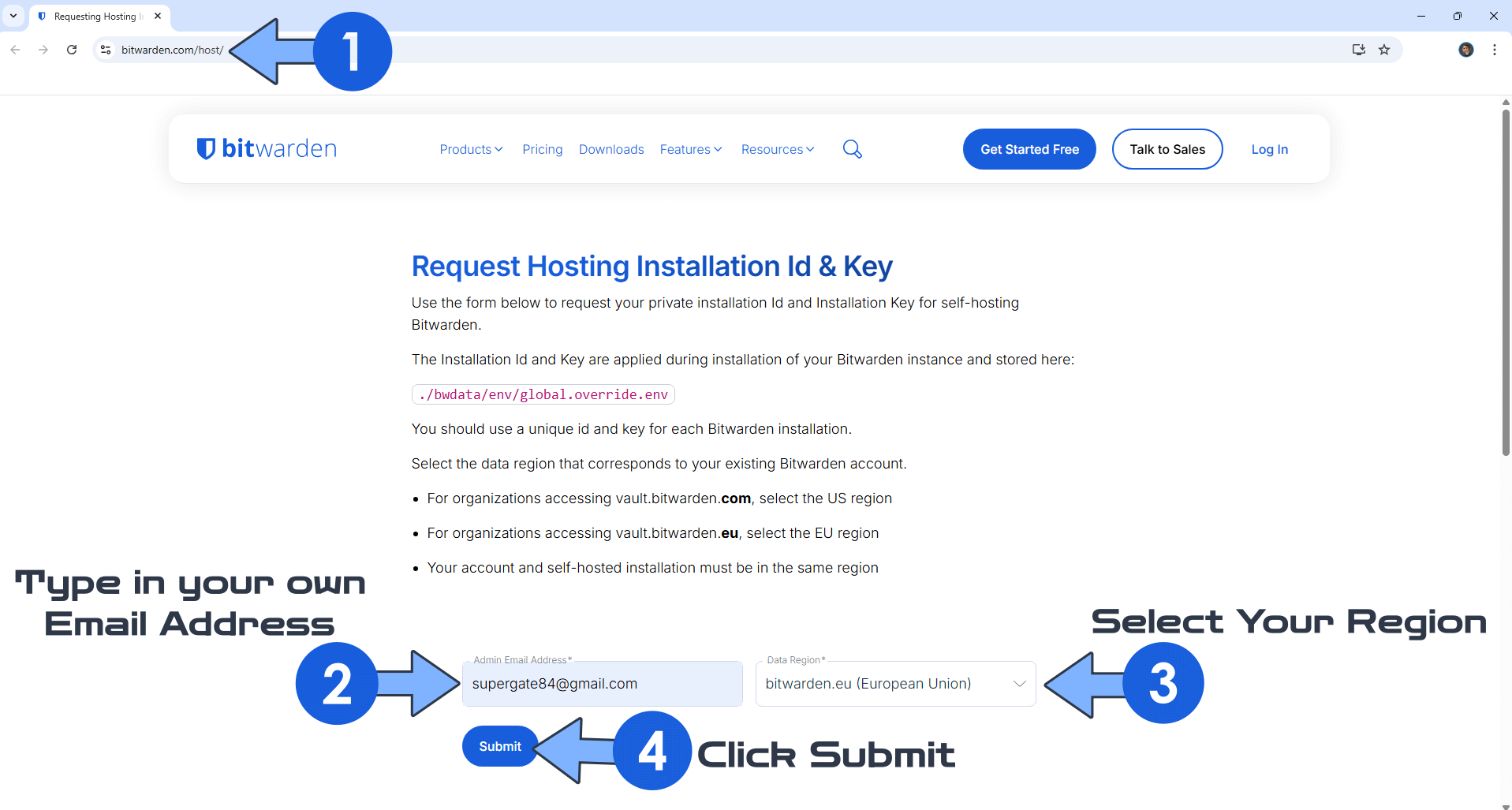
STEP 14
After you click Submit at STEP 13, you will automatically get an INSTALLATION ID and an INSTALLATION KEY. Copy and save them to a safe place because you will need them at STEP 17.
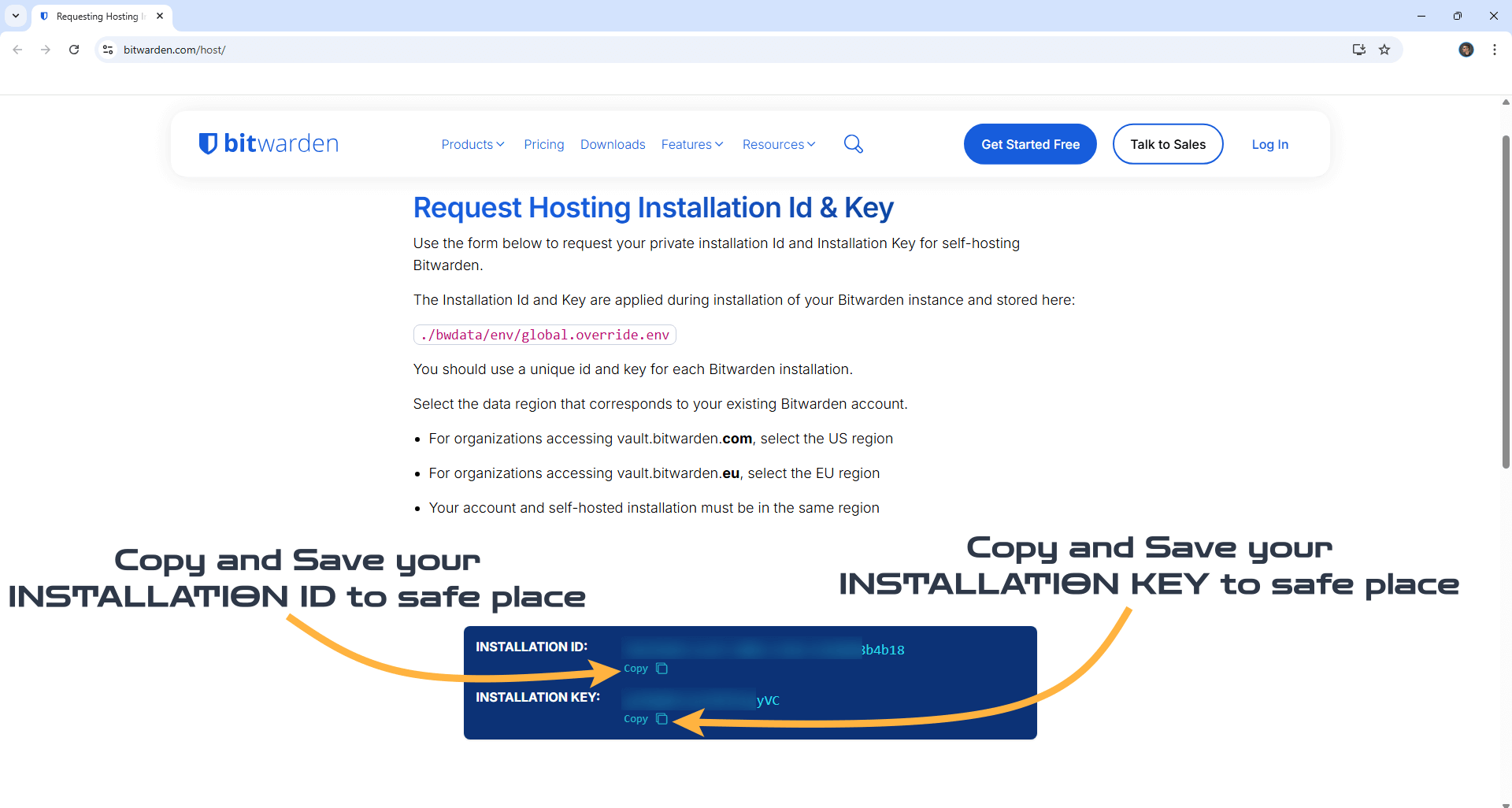
STEP 15
Follow my step by step guide on how to activate SMTP for your Gmail account. This step is mandatory. Note: If you don’t want to use the easiest way for SMTP with Google and you already have SMTP details from your own Mail Server, you can just skip this STEP and use your personalized email SMTP details instead.
STEP 16
Log into Portainer using your username and password. On the left sidebar in Portainer, click on Home then Live connect. Follow the instructions in the image below.

On the left sidebar in Portainer, click on Stacks then + Add stack. Follow the instructions in the image below.

STEP 17
In the Name field type in bitwarden. Follow the instructions in the image below.
services:
db:
image: mariadb:11.8-noble #LTS Long Time Support Until October 15, 2033.
container_name: Bitwarden-DB
hostname: bitwarden-db
security_opt:
- no-new-privileges:false
environment:
- TZ=Europe/Bucharest
- MYSQL_ROOT_PASSWORD=rootpass
- MYSQL_DATABASE=bitwarden_vault
- MYSQL_USER=bitwardenuser
- MYSQL_PASSWORD=bitwardenpass
volumes:
- /volume1/docker/bitwarden/db:/var/lib/mysql:rw
- /volume1/docker/bitwarden/db:/etc/mysql/conf.d:rw
restart: on-failure:5
bitwarden:
image: ghcr.io/bitwarden/self-host:beta
container_name: Bitwarden
hostname: bitwarden
security_opt:
- no-new-privileges:true
healthcheck:
test: curl -fsSo - http://localhost:8080
environment:
- BW_DOMAIN=bitwarden.yourname.synology.me
- BW_DB_PROVIDER=mysql
- BW_DB_SERVER=bitwarden-db
- BW_DB_DATABASE=bitwarden_vault
- BW_DB_USERNAME=bitwardenuser
- BW_DB_PASSWORD=bitwardenpass
- BW_INSTALLATION_ID=Your-Own-Bitwarden-Installation-ID
- BW_INSTALLATION_KEY=Your-Own-Bitwarden-Installation-KEY
- UID=1026
- GID=100
- BW_ENABLE_ADMIN=true
- globalSettings__logDirectory=/etc/bitwarden/logs
- adminSettings__admins=Your-own-gmail-address
- globalSettings__disableUserRegistration=false
- globalSettings__mail__replyToEmail=Your-own-gmail-address
- globalSettings__mail__smtp__host=smtp.gmail.com
- globalSettings__mail__smtp__ssl=false
- globalSettings__mail__smtp__port=587
- globalSettings__mail__smtp__username=Your-own-gmail-address
- globalSettings__mail__smtp__password=Your-own-app-password
ports:
- 9890:8080
volumes:
- /volume1/docker/bitwarden/data:/etc/bitwarden
- /volume1/docker/bitwarden/logs:/var/log/bitwarden
restart: on-failure:5
depends_on:
db:
condition: service_started
Note: Before you paste the code above in the Web editor area below, change the value for TZ. (Select your current Time Zone from this list.)
Note: Before you paste the code above in the Web editor area below, change the value for BW_DOMAIN and type in your own synology.me DDNS without https:// at the beginning that you have previously created at STEP 6.
Note: Before you paste the code above in the Web editor area below, change the value for BW_INSTALLATION_ID and type in your own Bitwarden INSTALLATION ID that you have previously copied and saved at STEP 14.
Note: Before you paste the code above in the Web editor area below, change the value for BW_INSTALLATION_KEY and type in your own Bitwarden INSTALLATION KEY that you have previously copied and saved at STEP 14.
Note: Before you paste the code above in the Web editor area below, change the value numbers for UID and GID with your own values. (Follow my step by step guide on how to do this.) 1026 is my personal UID value and 100 is my personal GID value. You have to type in your own values.
Note: Before you paste the code above in the Web editor area below, change the value for adminSettings__admins and type in your own Gmail address. STEP 15.
Note: Before you paste the code above in the Web editor area below, change the value for globalSettings__mail__replyToEmail and type in your own Gmail address. STEP 15.
Note: Before you paste the code above in the Web editor area below, change the value for globalSettings__mail__smtp__username and type in your own Gmail address. STEP 15.
Note: Before you paste the code above in the Web editor area below, change the value for globalSettings__mail__smtp__password and type in your own Gmail app password. STEP 15.
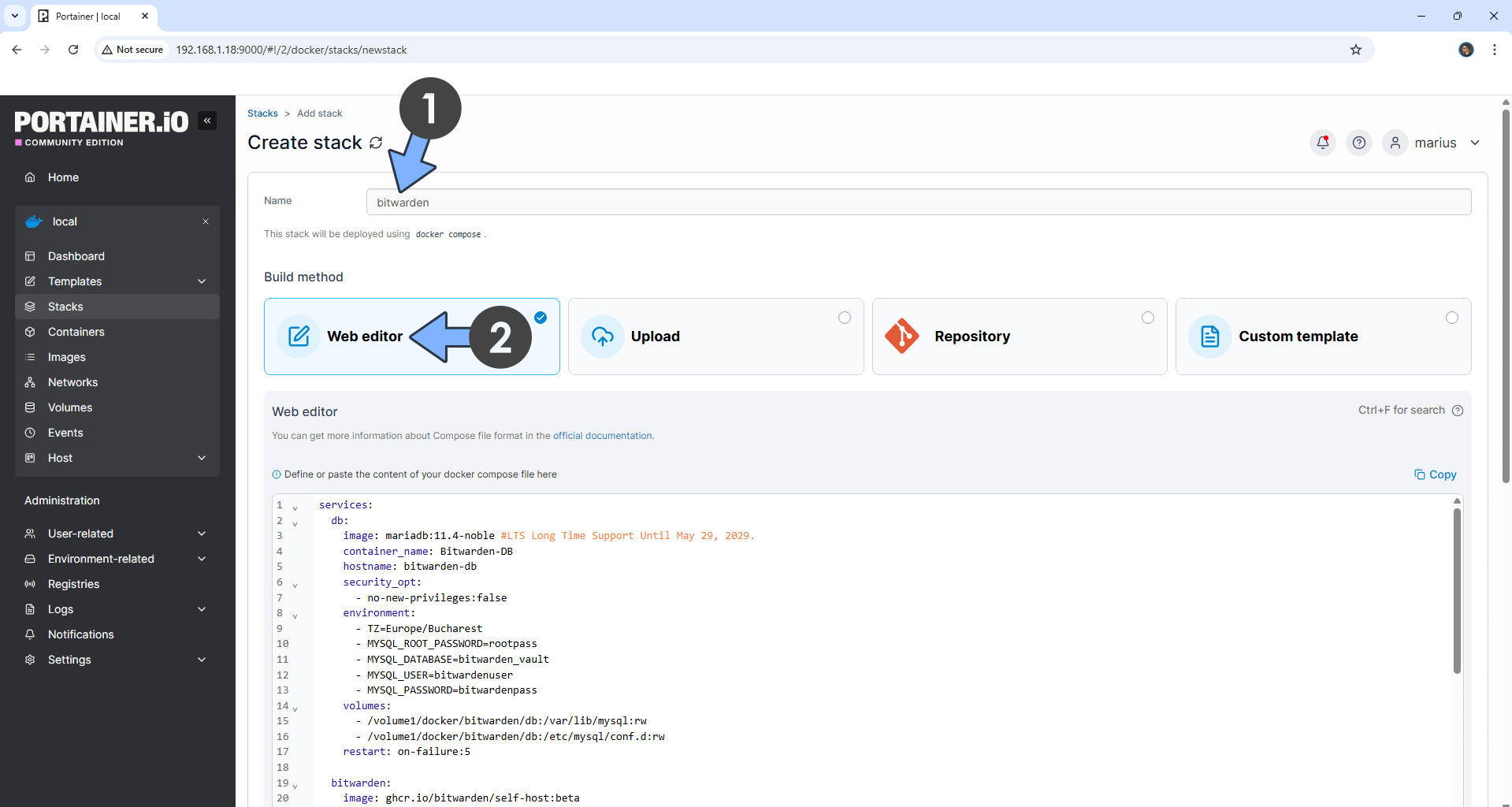
STEP 18
Scroll down on the page until you see a button named Deploy the stack. Click on it. Follow the instructions in the image below. The installation process can take up to a few minutes. It will depend on your Internet speed connection.
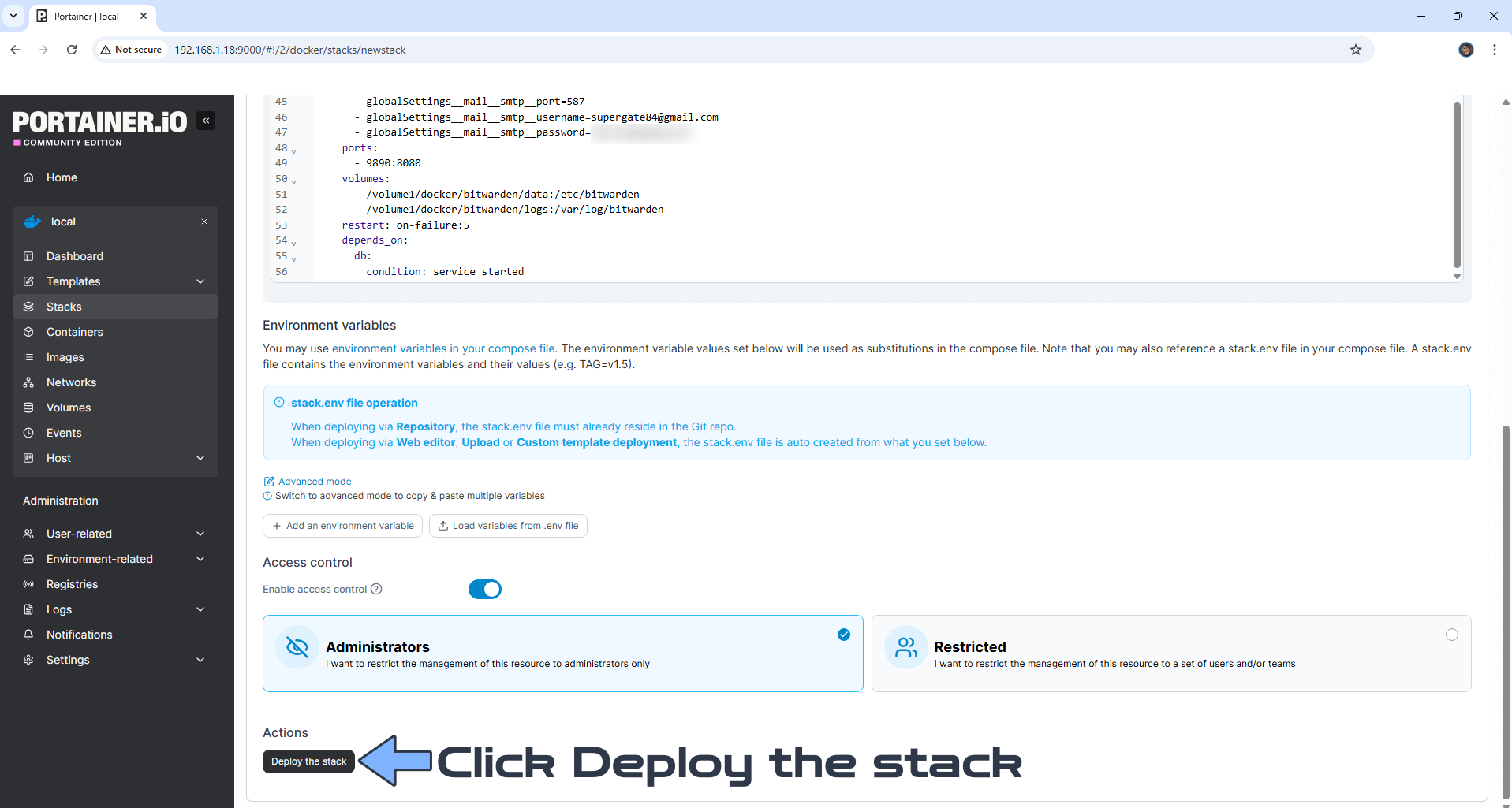
STEP 19
If everything goes right, you will see the following message at the top right of your screen: “Success Stack successfully deployed“.

STEP 20
🟢Please Support My work by Making a Donation. Almost 99,9% of the people that install something using my guides forget to support my work, or just ignore STEP 1. I’ve been very honest about this aspect of my work since the beginning: I don’t run any ADS, I don’t require subscriptions, paid or otherwise, I don’t collect IPs, emails, and I don’t have any referral links from Amazon or other merchants. I also don’t have any POP-UPs or COOKIES. I have repeatedly been told over the years how much I have contributed to the community. It’s something I love doing and have been honest about my passion since the beginning. But I also Need The Community to Support me Back to be able to continue doing this work.
STEP 21
Now open your browser and type in your HTTPS/SSL certificate like this https://bitwarden.yourname.synology.me/#/signup In my case it’s https://bitwarden.mariushosting.synology.me/#/signup If everything goes right, you will see the Bitwarden Register account page. Type in your own Email (adminSettings__admins) that you have previously added at STEP 17, and Name. Click Continue. Follow the instructions in the image below. Note: If you forget to add /#/signup after your synology.me DDNS, you will not be able to register an account.
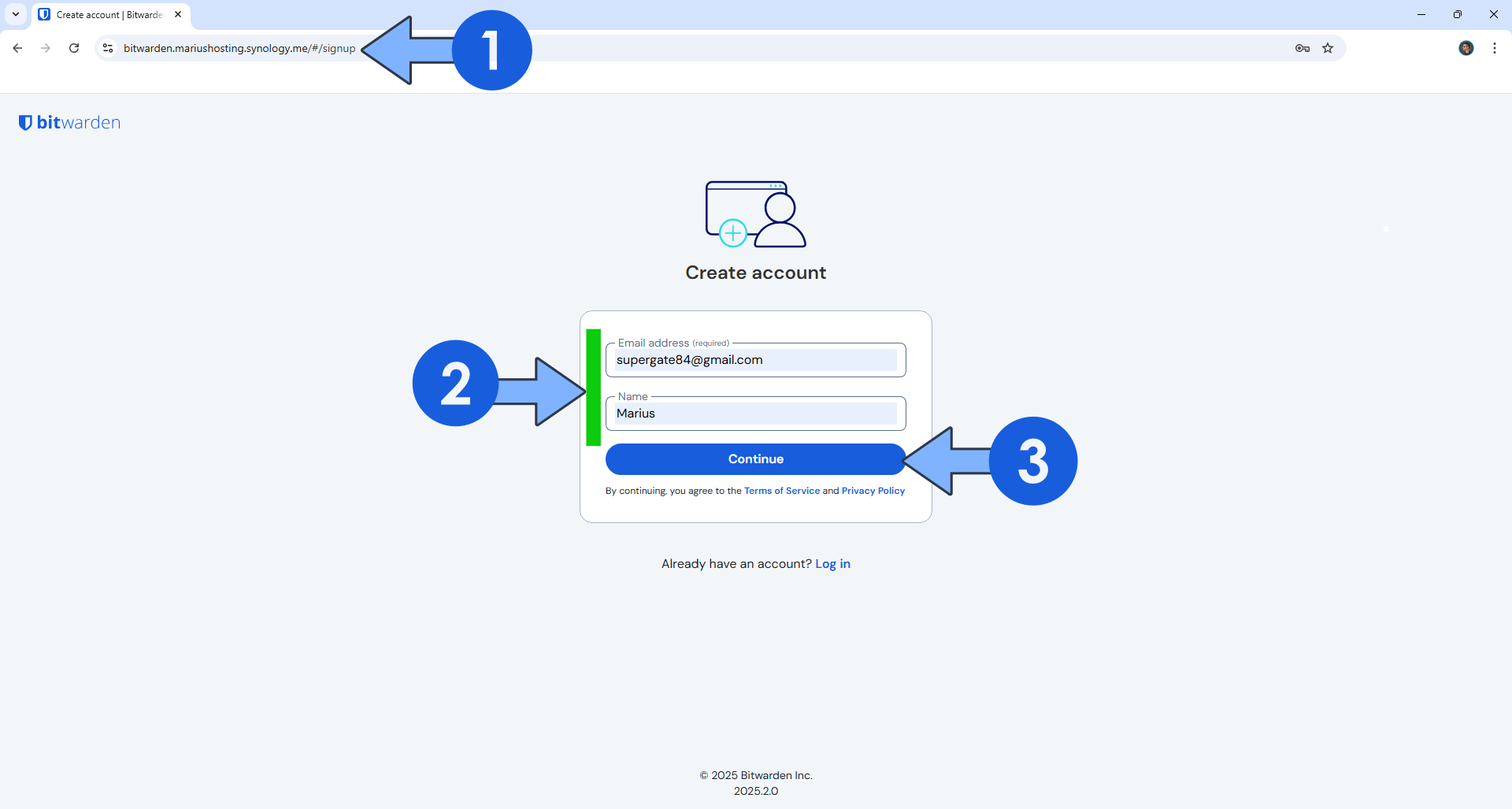
STEP 22
If you get an error message when registering that says: unhandled server error, just wait for a few seconds/minutes, then click the Continue button again. If the error message pops up again, make sure the BW_DOMAIN at STEP 17 is correctly added. Also check if your email credentials at STEP 17 are correct. If you notice there was a typo somewhere in your compose stack at STEP 17, you will need to start the Bitwarden installation from scratch. Remember to follow the Docker Clean guide to the letter before your start the installation again. And make sure there are no typos next time.
STEP 23
Type in your Master Password, confirm it, then click Create Account. Wait a few seconds until your account is created. Follow the instructions in the image below.
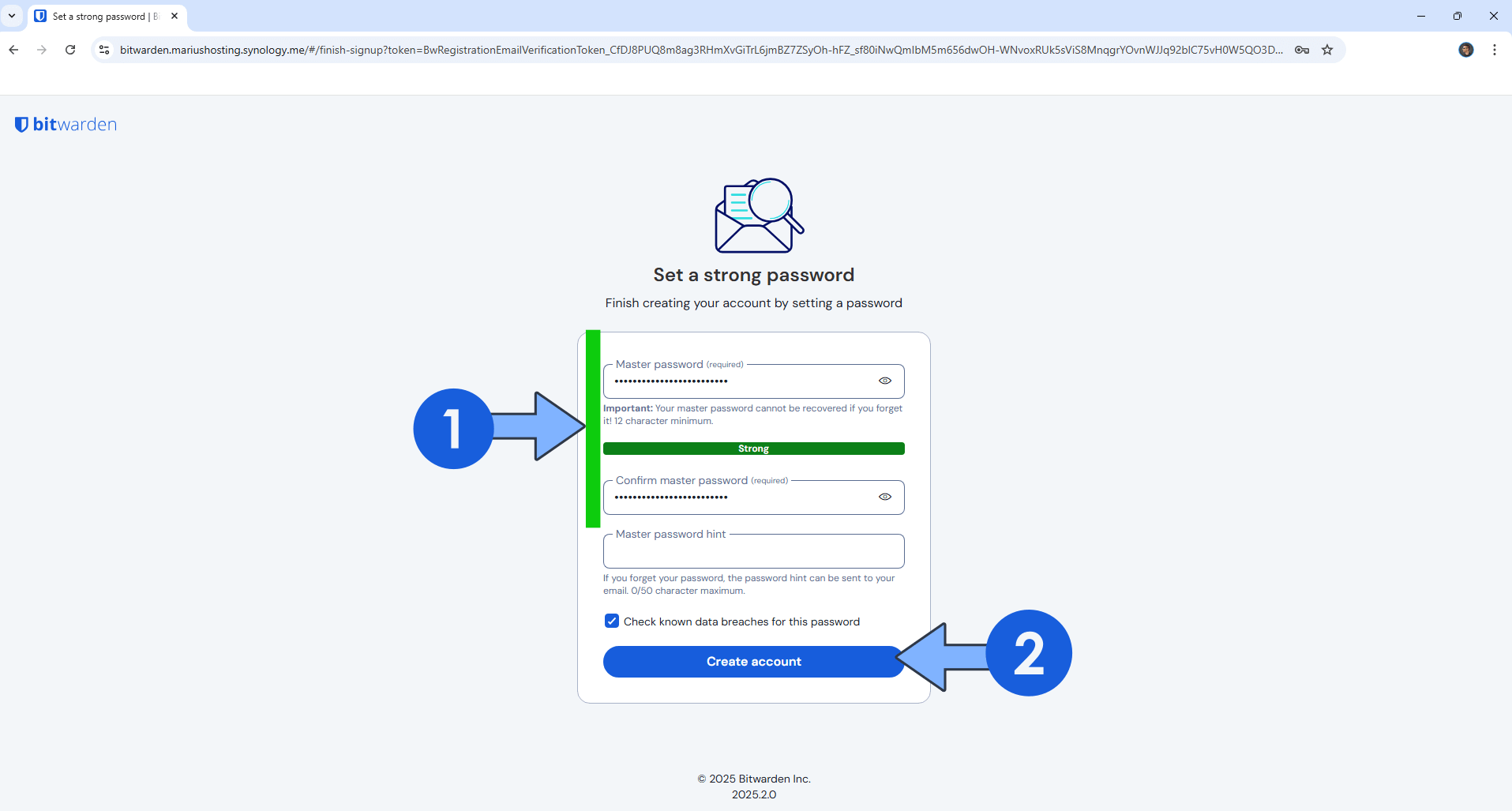
Wait a few seconds until your account is created. Follow the instructions in the image below.
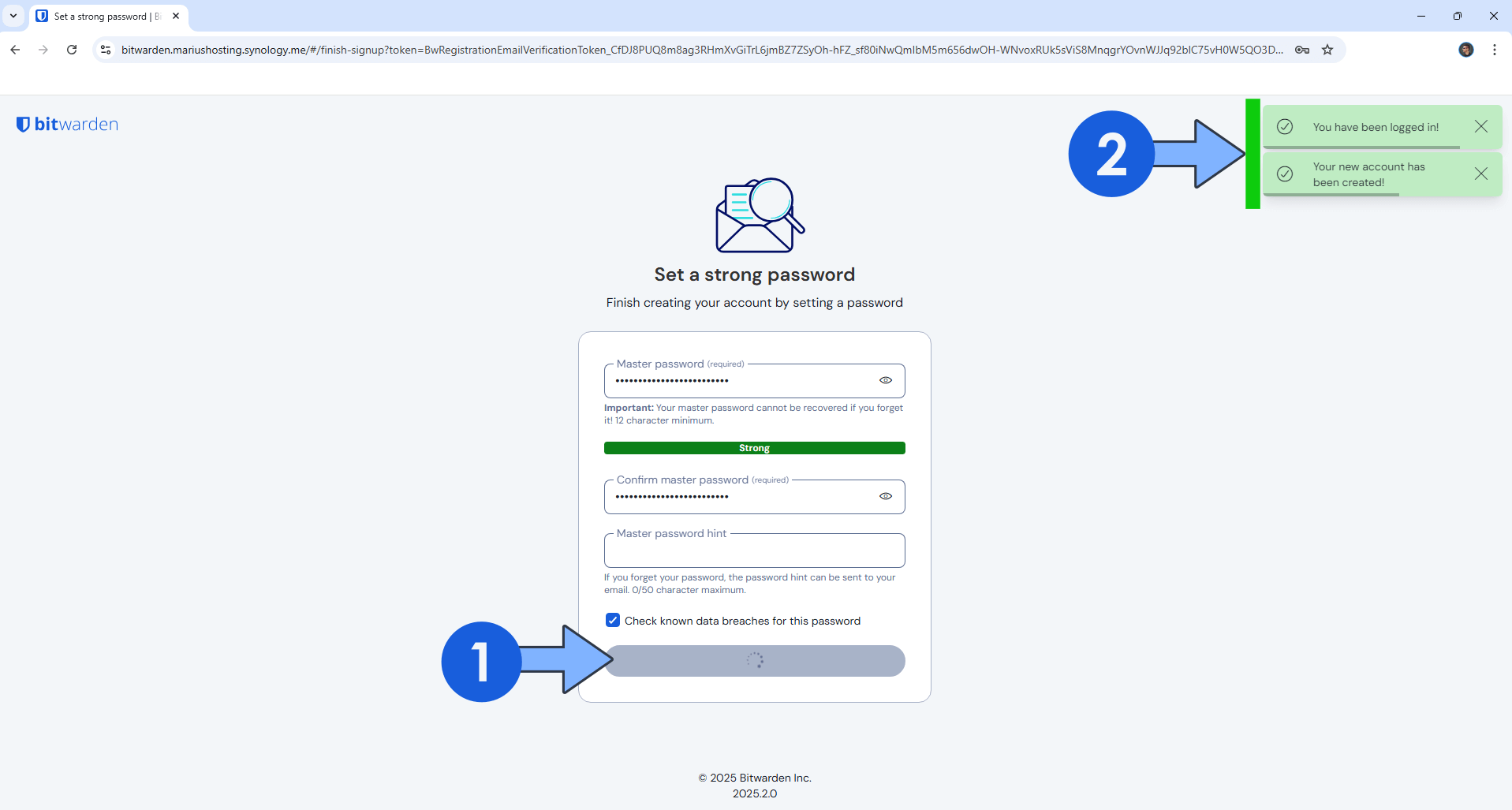
STEP 24
After the account is created, you will also receive a Welcome email. Go to the next STEP.
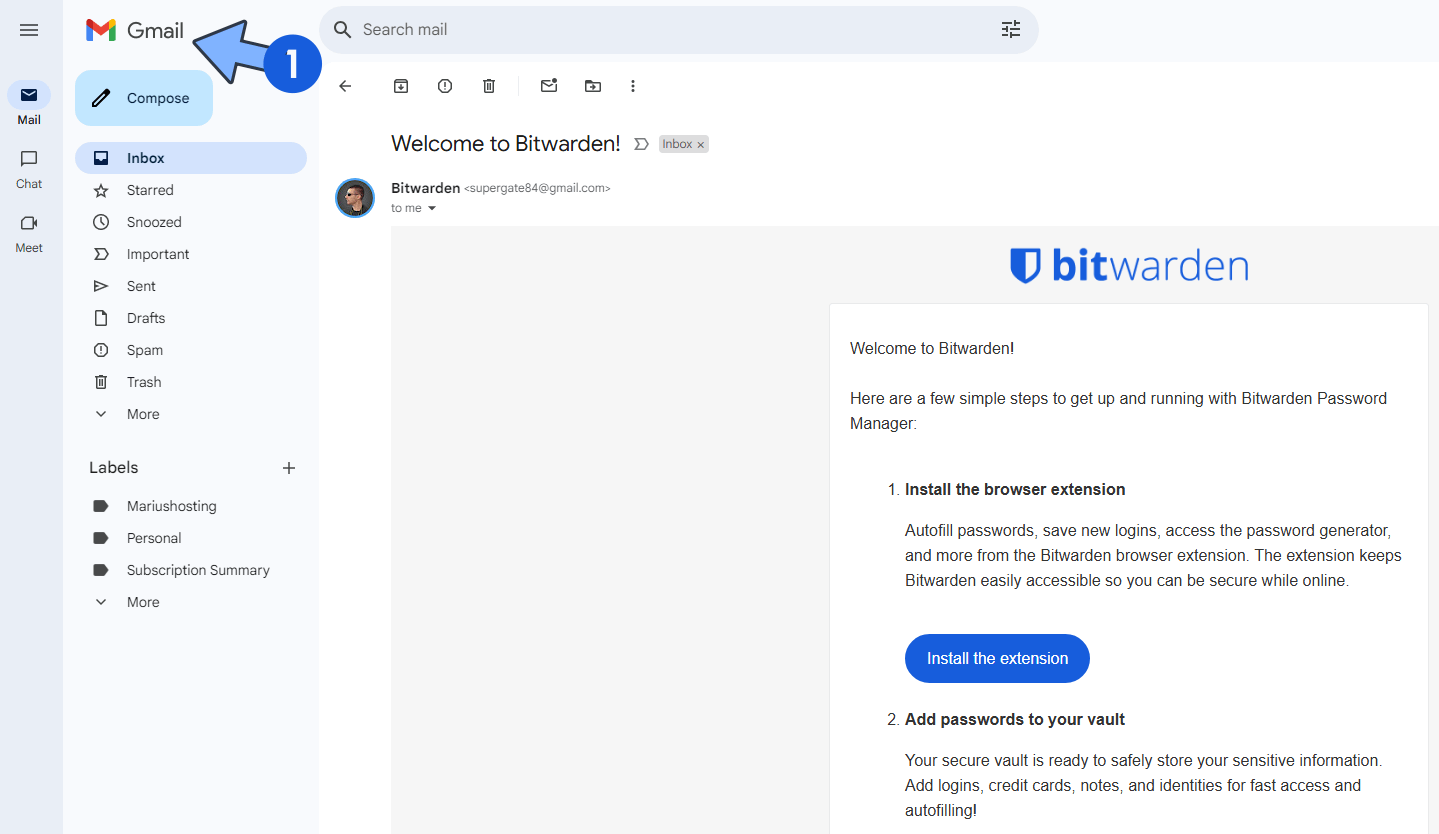
STEP 25
Your official Bitwarden at a glance!
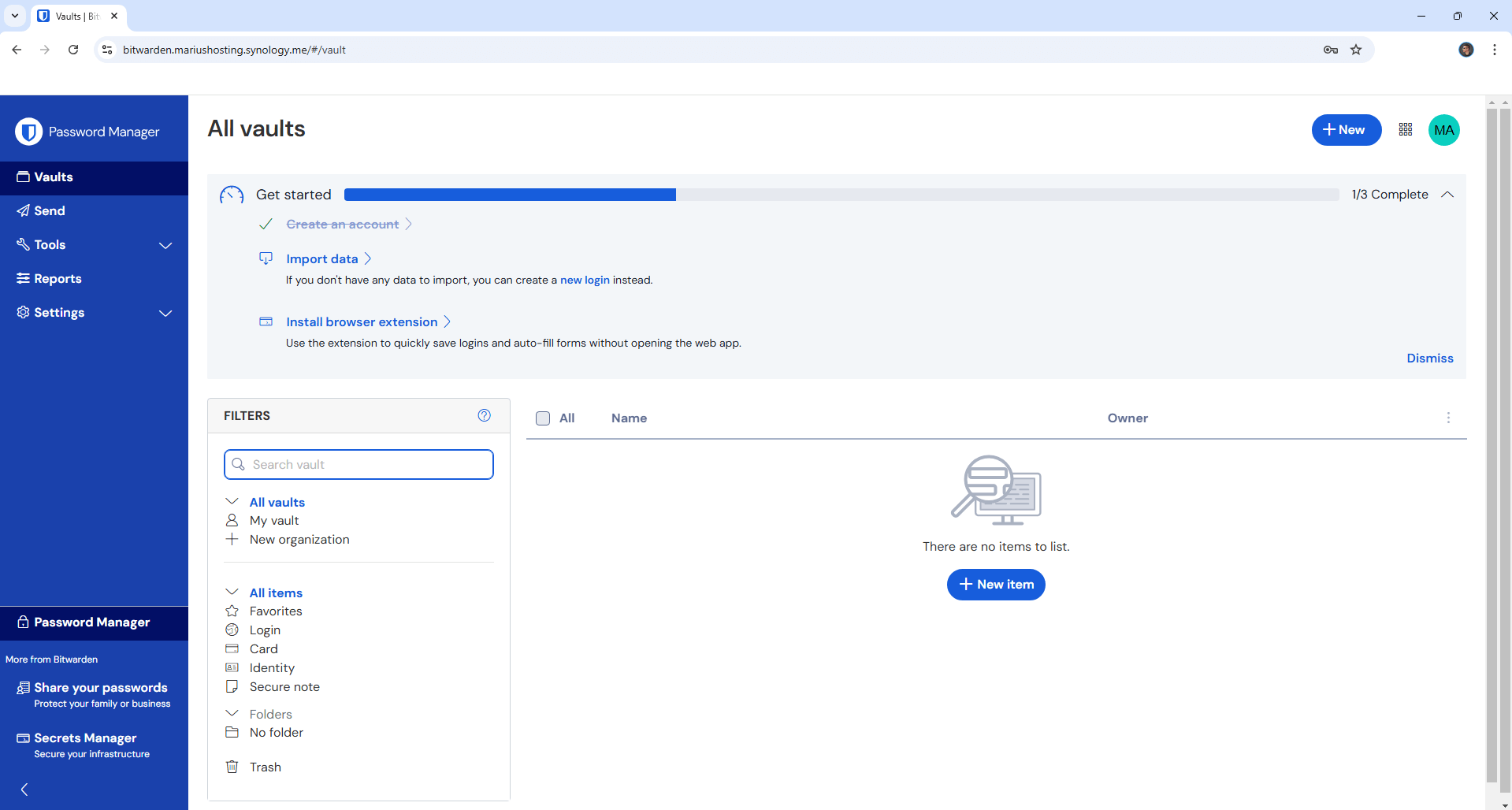
STEP 26
One of the most important things you need to know about Bitwarden is that anyone who can access your HTTPS Bitwarden link can register for a new account by default. Follow my step by step guide below to disable registration of new users in Bitwarden. Open Portainer then go to Stacks. Localize then click on your bitwarden stack that you have previously created at STEP 17. Click the EDITOR tab then change the value on line globalsettings__disableUserRegistration from:
– globalsettings__disableUserRegistration=false to – globalsettings__disableUserRegistration=true
Click Update the stack. Follow the instructions in the image below.
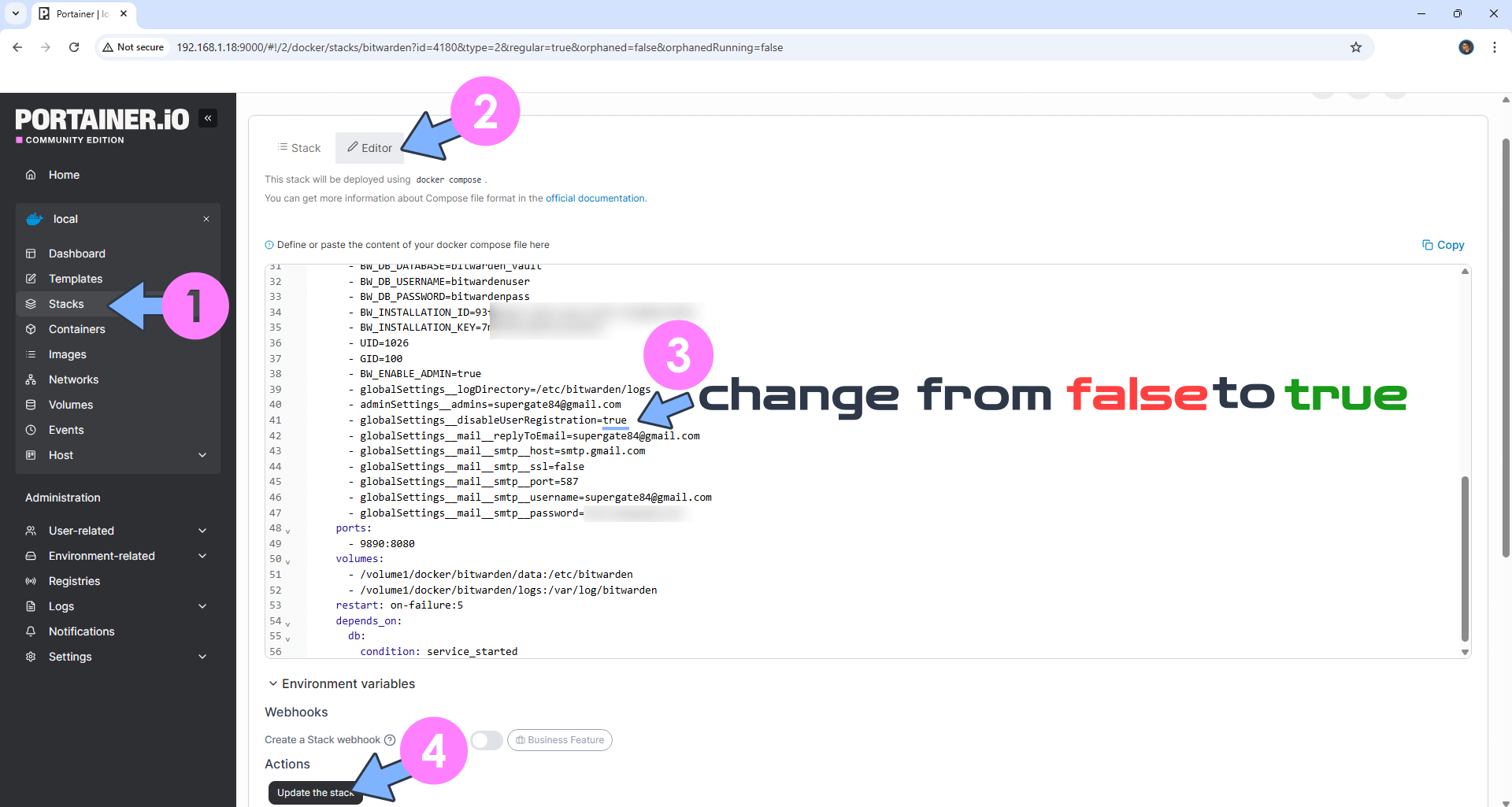
A new pop up window will open. Click Update.
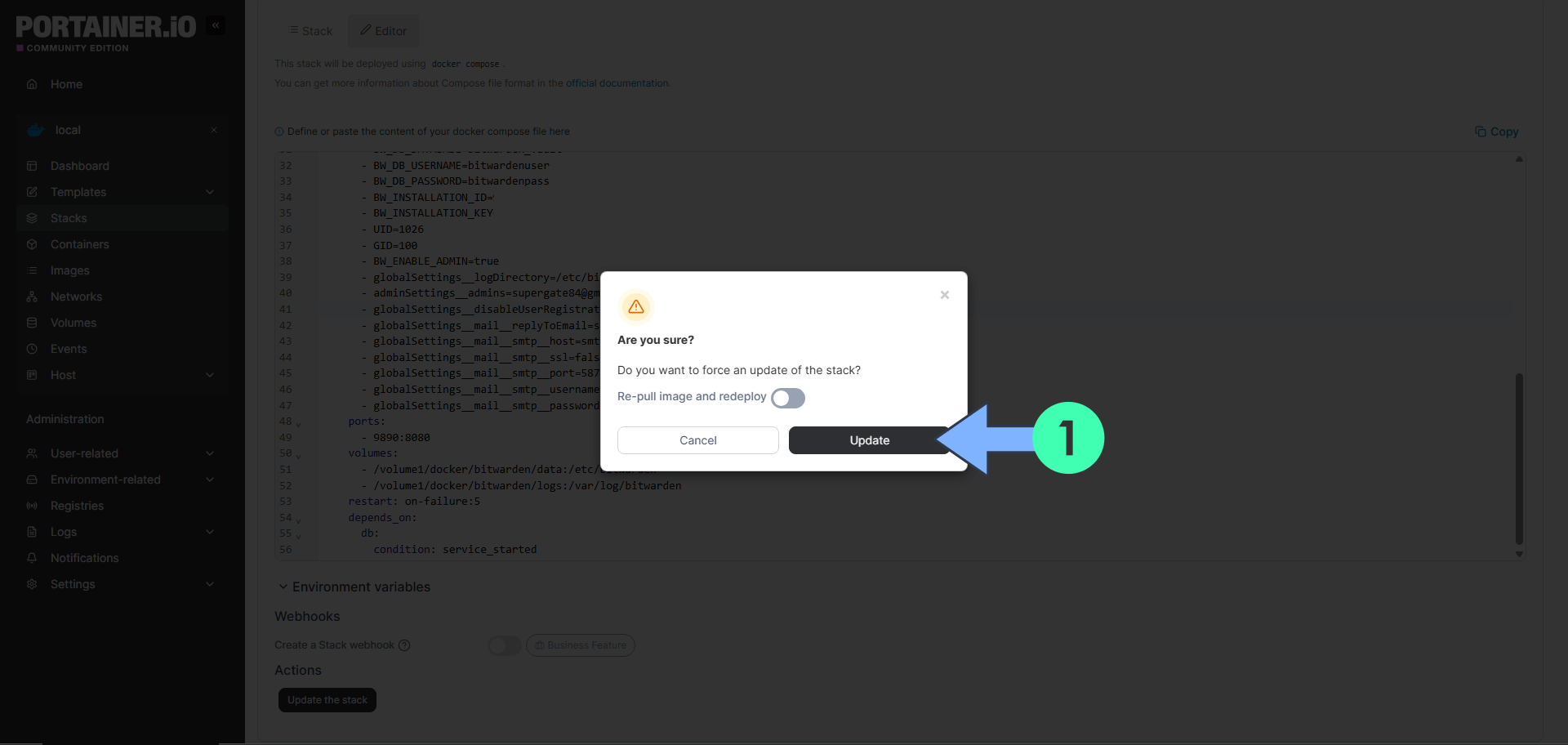
When new users try to register, they will receive the following error message: “An error has occurred. Open Registration has been disabled by the system administrator”. To reactivate user registration, change the value from true to false.
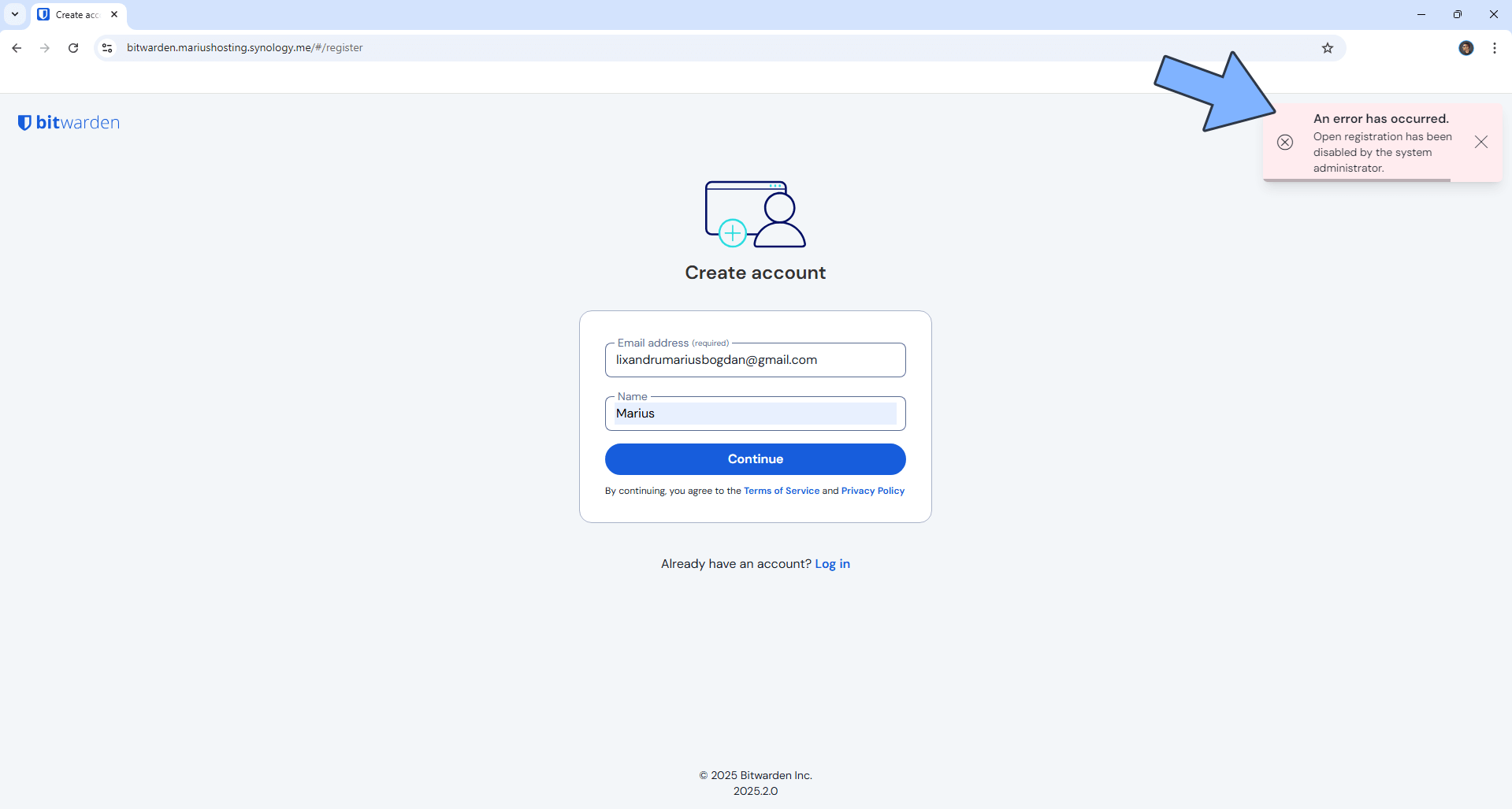
STEP 27
If you want, you can also access your Bitwarden admin dashboard at https://bitwarden.yourname.synology.me/admin In my case it’s https://bitwarden.mariushosting.synology.me/admin
STEP 28
You can also change the theme from Light to Dark. On the left sidebar in Bitwarden, click Settings, then Preferences. Select the Dark theme, then click Save. Follow the instructions in the image below.
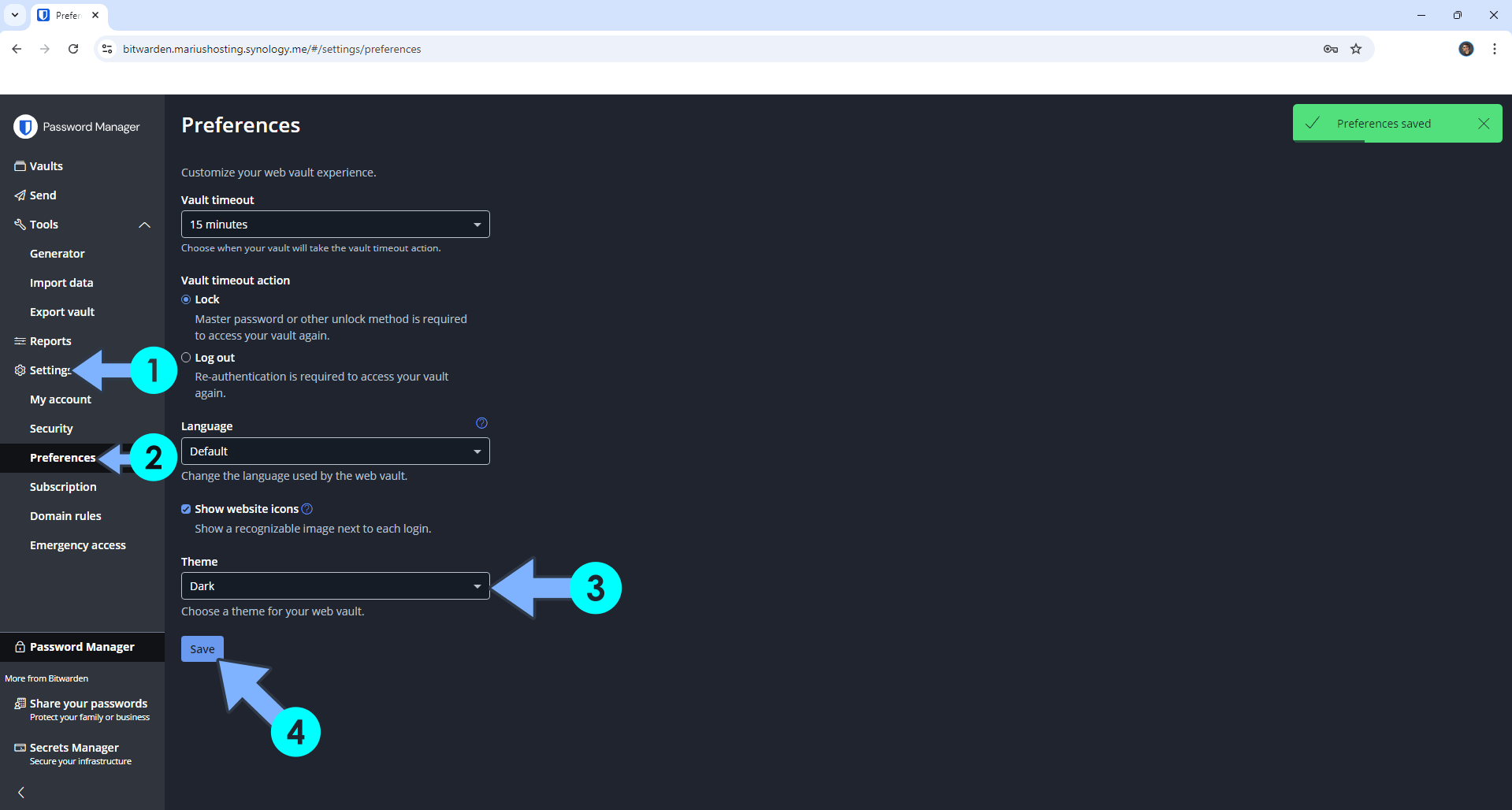
STEP 29
Your Bitwarden dashboard at a glance!
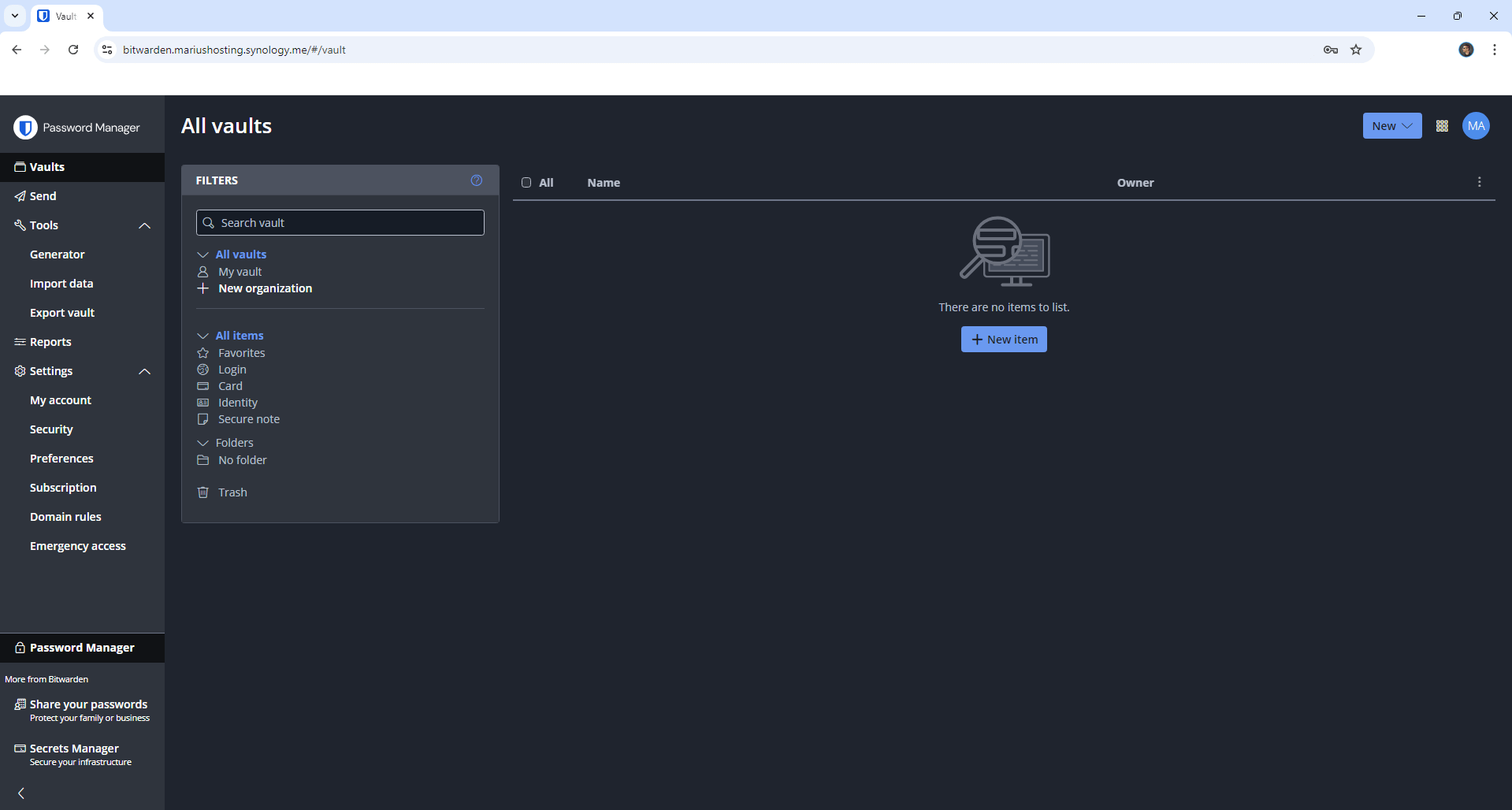
Enjoy Bitwarden!
Note: If you encounter issues by using this container, make sure to check out the Common Docker issues article.
Note: Can I run Docker on my Synology NAS? See the supported models.
Note: How to Back Up Docker Containers on your Synology NAS.
Note: Find out how to update the Bitwarden container with the latest image.
Note: How to Free Disk Space on Your NAS if You Run Docker.
Note: How to Schedule Start & Stop For Docker Containers.
Note: How to Activate Email Notifications.
Note: How to Add Access Control Profile on Your NAS.
Note: How to Change Docker Containers Restart Policy.
Note: How to Use Docker Containers With VPN.
Note: Convert Docker Run Into Docker Compose.
Note: How to Clean Docker.
Note: How to Clean Docker Automatically.
Note: Best Practices When Using Docker and DDNS.
Note: Some Docker Containers Need WebSocket.
Note: Find out the Best NAS Models For Docker.
Note: Activate Gmail SMTP For Docker Containers.
This post was updated on Wednesday / February 18th, 2026 at 9:59 AM
